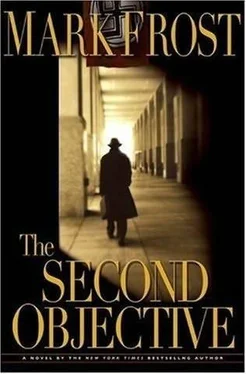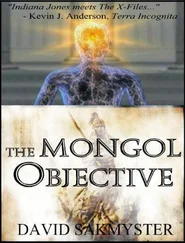What is this?
A priest appeared at his side. Was he all right?
Yes, yes, he just needed a rest.
Von Leinsdorf slid into a pew and let his eyes drift up and around the chapel. He vaguely remembered that this was the oldest church in Paris. A bank of windows on one side had been shattered by a bomb, and he could see a storm drawing into the late afternoon sky above. He closed his eyes for a moment.
When he opened them again, he saw through the broken windows that the sky had turned pitch black. He glanced at his watch. Over an hour had vanished. He looked around, startled. The music had stopped, the choir was gone. The same priest was talking with a gendarme at the back of the church. Von Leinsdorf got up quickly, gathered his things, and walked out.
Montmartre
DECEMBER 19, 6:30 P.M.
Eddie Bennings heard him on the stairs before he came through the door. Von Leinsdorf was wearing a long greatcoat when he entered their garret and he immediately went into the second room to change. Bennings, who was pitching pennies against a bare wall in the front room, under the light of the room’s only lamp, never saw the British uniform.
“Where you been, Dick? I was starting to worry,” said Eddie.
“Nothing to worry about,” said Von Leinsdorf from the other room. “Making arrangements. What was your day like?”
“Boring. Just sitting around on my ass.”
Bennings had decided not to mention his own outing that morning. He picked up Stars and Stripes while he waited and made conversation.
“Did you hear they can’t find Glenn Miller? They think his plane went down over the Channel.”
“When did that happen?”
Von Leinsdorf came out dressed in civilian clothes. He carried a greatcoat and was using a needle and thread to sew a flap inside its left front panel. Bennings glanced at him without curiosity and went back to his paper.
“Don’t know. Last few days. On his way to Paris to organize a Christmas concert.”
“Was it the Krauts?” asked Von Leinsdorf.
“Had to be. Crying shame, isn’t it? You know how many times that guy’s music got me laid? I got no quarrel with the Krauts, but I’d like to get my hands on the punks who did this. Man, I’m starving. Haven’t been out all day.”
“Where did you get the newspaper?”
“Found it downstairs.”
“So you did go out,” said Von Leinsdorf.
“I went out once, briefly, for a pack of cigarettes.”
Von Leinsdorf moved to the window and looked out the curtains. The clouds had lowered and the rain that had threatened was starting to fall.
“Did you speak to anyone?”
“No, Christ, no. You want to get something to eat? What time we meeting him?”
“Seven.”
“What time is it now?”
“Half past six.”
Von Leinsdorf saw two men standing across the street from the entrance to the building. Both were looking up at the attic window. He turned off the lamp inside the room, retrieved his binoculars, and took a closer look at them.
A gendarme and a smaller, swarthy-faced man, a civilian. Both unfamiliar. Not who he’d expected.
“Something wrong?” asked Eddie.
“I don’t know yet.”
“So what do you say we grab some grub?”
“We’ll get something at the club.”
When they walked outside and started down the hill through the winding streets toward Ververt’s club, the two men across the street were gone. They arrived ten minutes ahead of schedule, tapped on the front window, and waited for someone to appear. Von Leinsdorf knew they were being followed, probably by the gendarme and his companion, but never caught a glimpse of them. One of Ververt’s men opened the front door of the jazz club and they went inside.
Ververt sat at his table near the kitchen. He asked if they were hungry, more hospitable this time, as one of the men set down a bottle of red wine and a platter of bread, cheese, and green olives. Ververt asked to hear their proposal, and he listened carefully, saying nothing while Eddie laid out the details of the Christmas train job.
“How many trucks do we need?” asked Ververt when Eddie was done.
“That’s up to you,” said Eddie. “We can fill two or three.”
“What time do they need to leave Paris?”
“We need a ride to the depot,” said Von Leinsdorf. “We have to be there by midnight, so we should be on the road by nine. Have them meet us at the Invalides metro stop. They drop us at the yard, then drive back into Versailles.”
“We’ll hook up on the spur line at three when we bring the train in to load up,” said Eddie.
“How long will that take?”
“Once the train’s there, not more than an hour. The trucks should be back in the city by first light.”
Ververt looked at his cigarette. “What about security on the train?”
“We’ve got that covered out of our end.”
“And the money?”
“Fifty thousand,” said Eddie. “Half now, half on delivery.”
Ververt flicked his cigarette, a gesture of disdain. “I don’t know what I’m buying.”
“We’ve got to take care of the boys on the train before they’ll open it up,” said Eddie.
“Why should that be my concern?” asked Ververt.
“Because otherwise we don’t have a deal,” said Von Leinsdorf.
Ververt poured himself another glass of pastis. He nodded to one of his men, who stepped forward and set a gray strongbox down on the table. Ververt opened it and counted out ten thousand American dollars.
“The rest when we finish loading the trucks,” he said.
The money sat on the table between them for a long beat. Ververt closed the strongbox to punctuate the finality of the offer. Finally, Von Leinsdorf reached over and picked up the money.
“Coffee?” asked Ververt.
The corrupt patrolman and the pimp had been taken aback by the appearance of the second man, who arrived at the rooming house soon after they took up their surveillance. They assumed he was another American deserter, and decided to alter their approach. Instead of charging up to the garret, they waited and followed the men, when they left their building, to a jazz club owned by a notorious local gangster. They observed them through a window, sitting down with Ververt. The connection to Ververt made the pimp question the wisdom of taking these two down, but the patrolman, who had collected payoffs from the Corsican for years, felt more certain than before that they were viable targets. These were unknown players with no local standing. Ververt was probably setting them up for a sting, so they might as well beat him to it.
Shortly after seven o’clock at the Hotel Meurice, a British major marched down to the front desk in his bathrobe and registered a noisy complaint about a missing dress uniform that he had sent for cleaning the previous day. Bernie and Grannit were on the house phones, calling each resident officer, working their way through the registration cards, when they overheard the major’s tirade.
So did an Algerian chambermaid, who was standing in a nearby line of employees waiting to be questioned by the hotel’s chief of security. She stepped forward to say she remembered seeing a valet returning a major’s uniform earlier that day on the fourth floor. The major’s anger went up a few decibels-he was staying on the second floor, so why the bloody hell was his uniform being delivered on the fourth floor? The major then answered his own question: because theft was rampant in this bloody hotel, that was why, because of the overwhelming presence in this city of the bloody Wogs.
“Just another reminder that the Wogs begin at Calais,” he was heard to say.
The chief of security called Grannit over to hear the maid’s story, and inserted himself between them.
Читать дальше












